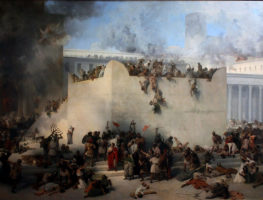There’s nothing that unites us in the experience of being human quite like waiting. No matter our age, our education, our accomplishments, or time spent following Jesus, we will have to wait.
This is why the Advent season is necessary for the shaping of our lives.
Each of the seasons of the Liturgical Calendar leads us in paying particular attention to Christian themes and practices. Lent reminds us, among many things, to place God’s way—and not our appetites—as the guiding principle for our lives. Eastertide calls us to live a spirituality of feasting and joy anchored in Christ’s resurrection. Pentecost gives us a vision of life filled with God’s power because the Spirit has been poured out on us.
The Advent season is one in which God trains us in waiting.
Wait Training
This training is oriented towards the formation of our lives because what God does in us as we wait is more important than what we are waiting for.
Many of the stories of scripture point to the excruciating pain and trouble experienced by the people of God because of their refusal to wait for God. This has been our story to this day.
For example, in Exodus 32 (the story of the golden calf), the Israelites, in a moment of anxiety, impulsively fashion an idol to provide security for themselves because Moses was nowhere to be found. This idol creation came days after God informed them that this kind of religious practice was off limits now that they were delivered from Pharaoh.
Anxiety will make us do irrational things.
Their waiting was difficult because they couldn’t see what God was up to.
It’s hard for us to wait—and not just because we are impatient.
It’s hard to wait because we often don’t believe God is at work in our lives.
But Advent reminds us that God has come, is coming, and will come again. It’s the annual reminder that God is for creation and moves towards us.
Even so, it’s hard to wait. One of the primary reasons it’s hard to wait is because our understanding of waiting has been incomplete.
As a pastor, I’m frequently asked to help people understand what it means to wait on the Lord. I submit to you a few things I have learned along the way. It’s hard to wait because we often don’t believe God is at work in our lives. #Advent Click To Tweet
Four Important Elements of Waiting
Reflective Prayer
Henri Nouwen has said, “Active waiting is waiting that pays attention, is fully present to what is really going on, even when to all outward appearances, nothing is going on.”
One of the primary ways of this kind of waiting that pays attention is in reflective prayer. Prayer is not simply articulating our needs before God. It’s also making ourselves available for God to articulate his movements before us.
Advent is a season of waiting in a posture of prayerful attention. It’s often when we get silent that we can finally begin to trace God’s movements in our lives.
Friends on the Journey
Waiting is much easier when done in community. This is one of the reasons Jesus asked his disciples to join him as he awaited his death (unfortunately they fell asleep on him!). Advent is a reminder that waiting is a communal act.
Mary and Elizabeth wait together.
Simeon and Anna wait in community.
The people of God expectantly waited together.
Advent is an invitation to seek out friends on the journey who will help us process, discern and sit in silence with us as we discern God’s activity.
The Hearing of the Gospel Preached
As we wait, our souls need to be grounded in hope that comes from the proclamation of the gospel. We each need a word spoken to us regularly that reminds us of God’s faithful coming in Jesus.
Sunday worship is not a time to get religious goodies and head home. It’s an opportunity to open ourselves to God’s creative word, which is to anchor us in a story that is often at odds with the stories we tell ourselves.
Waiting is an Active Activity
To wait on the Lord doesn’t mean inactivity. It doesn’t mean a refusal to take initiative, or to seek and search for opportunities (a new job, a romantic relationship, etc). Rather, it’s a refusal to move without connecting our lives to God in prayer and reflection, first and often.
Eugene Peterson has said, “Waiting in prayer is a disciplined refusal to act before God acts.”
Sometimes waiting on the Lord means “staying put” in a particular situation until you get further instructions. At other times, it requires us to move forward—but in a way that is grounded in prayer.
Ultimately, to wait on the Lord is a way of life that comes against our tendencies to be impulsive, to be anxiously reactive, and wise in our own eyes.
If decisions are being made that are anxiously reactive and impulsive, chances are we need some practice in waiting on the Lord.
Advent reminds us that God has come, is coming, and will come again. It’s a great opportunity to train our souls in waiting. 'Waiting in prayer is a disciplined refusal to act before God acts.' Peterson Click To Tweet









Missio Alliance Comment Policy
The Missio Alliance Writing Collectives exist as a ministry of writing to resource theological practitioners for mission. From our Leading Voices to our regular Writing Team and those invited to publish with us as Community Voices, we are creating a space for thoughtful engagement of critical issues and questions facing the North American Church in God’s mission. This sort of thoughtful engagement is something that we seek to engender not only in our publishing, but in conversations that unfold as a result in the comment section of our articles.
Unfortunately, because of the relational distance introduced by online communication, “thoughtful engagement” and “comment sections” seldom go hand in hand. At the same time, censorship of comments by those who disagree with points made by authors, whose anger or limited perspective taints their words, or who simply feel the need to express their own opinion on a topic without any meaningful engagement with the article or comment in question can mask an important window into the true state of Christian discourse. As such, Missio Alliance sets forth the following suggestions for those who wish to engage in conversation around our writing:
1. Seek to understand the author’s intent.
If you disagree with something the an author said, consider framing your response as, “I hear you as saying _________. Am I understanding you correctly? If so, here’s why I disagree. _____________.
2. Seek to make your own voice heard.
We deeply desire and value the voice and perspective of our readers. However you may react to an article we publish or a fellow commenter, we encourage you to set forth that reaction is the most constructive way possible. Use your voice and perspective to move conversation forward rather than shut it down.
3. Share your story.
One of our favorite tenants is that “an enemy is someone whose story we haven’t heard.” Very often disagreements and rants are the result of people talking past rather than to one another. Everyone’s perspective is intimately bound up with their own stories – their contexts and experiences. We encourage you to couch your comments in whatever aspect of your own story might help others understand where you are coming from.
In view of those suggestions for shaping conversation on our site and in an effort to curate a hospitable space of open conversation, Missio Alliance may delete comments and/or ban users who show no regard for constructive engagement, especially those whose comments are easily construed as trolling, threatening, or abusive.